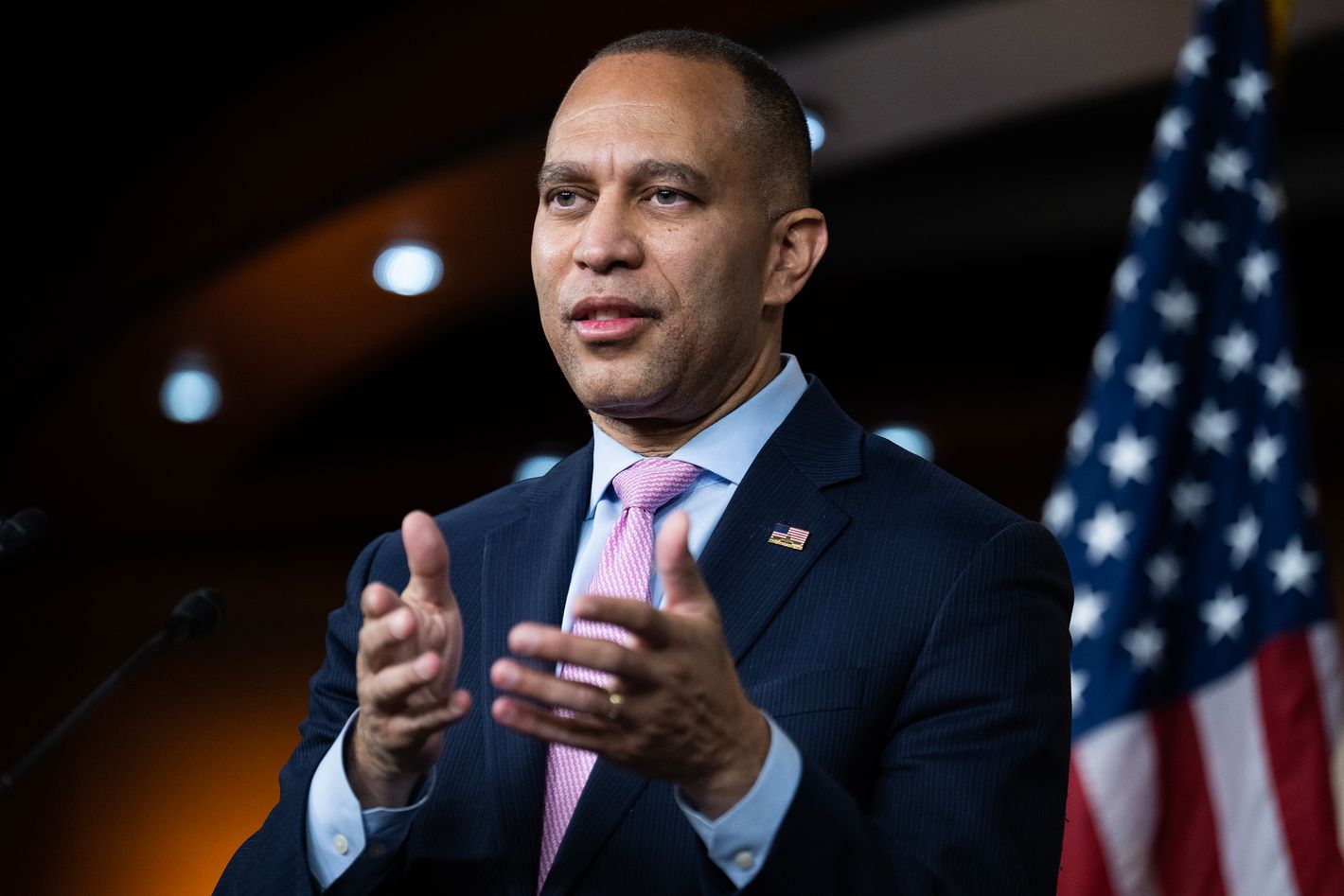Tom Williams/CQ-Roll Call/Getty Images
Democrats around the country have a spring in their step thanks to the feeling that the Trump 2.0 steamroller hit a pothole this week with a clumsy and quickly abandoned federal funding freeze. Launched by a poorly drafted and infinitely confusing OMB memo that freaked out bureaucrats far and wide, the effort to “pause” major forms of federal spending to ensure agencies weren’t pursuing freshly demonized policies like DEI and the Green New Deal caused temporary interruptions in all sorts of essential services, including the giant federal-state Medicaid program. Even as Team Trump tried to limit the damage by limiting the scope of the “pause,” real, live people were lighting up the phones to Congress wanting to know why the administration was doing this to them.
Democrats fed on the furor. A group close to House Minority Leader Hakeem Jeffries immediately put up a national cable ad:
As the ad shows, Democrats weren’t agitating the air about the arrogance being shown by Donald Trump’s budget minions, or the chaos it instilled, but painting a picture of a devilish plan to cut very specific and very sensitive federal programs and services in order to give money to billionaires like Elon Musk via tax cuts. This messaging wasn’t just a reflection of the Democratic Party’s sense of proprietorship about a strong and beneficent federal government. It also represented the well-justified belief that more abstract arguments against the Trump agenda had failed during the 2024 campaign and would probably fail in the future.
During his comeback bid, Trump talked often, albeit without much specificity, about the need to restrain federal spending, and he also reinforced the MAGA article of faith that the federal government was run by “deep state” obstructionists determined to undermine the will of the people. So he entered office with a pretty good claim that he had a mandate to go after “wasteful” federal spending. One person’s “waste,” of course, is another’s crucial service or benefit. So Trump’s public support on fiscal matters depends on keeping the argument for budget cutting as abstract as possible and/or tied to abstract and controversial concepts like DEI. Specificity is meat and drink for Trump opponents, and also food for thought among nervous Republican members of Congress facing midterm headwinds and hearing howls of fear and pain from constituents.
Democrats are likely to avoid abstract messaging as well with respect to the broader constitutional issues associated with Team Trump’s efforts to give their president extraordinary power over spending decisions. Russell Vought, who is almost certain to be confirmed by the Senate as OMB director (despite united and vociferous Democratic opposition), is on record asserting the unconstitutionality of the Impoundment Control Act, which is a legal bar to the kind of power grab the funding freeze represented; Vought appears to believe Trump should be able to claw back any spending he regards as wasteful or misguided, even though it has been appropriated by Congress. This is, to put it mildly, a minority point of view among legal experts, including conservatives. Whether or not this claim by Vought contributed to the abortive funding freeze, it will very likely be litigated soon, and will probably have to be resolved by the Trump-friendly U.S. Supreme Court.
But you shouldn’t expect Democrats to make big waves about this attempted power grab. Arguments over constitutional law or the appropriate separation of powers between executive and legislative branches of the federal government don’t, unfortunately, get people marching in the streets or even calling congressional offices. It is fresh in everyone’s memory that the least effective Democratic meta-message during the 2024 presidential election was the very accurate charge that Trump 1.0 represented a direct threat to constitutional order and democracy itself, as the New York Times emphasized in a postelection analysis:
Her campaign pitch was moving, even high-minded. If Vice President Kamala Harris were elected to the White House, she would safeguard the ideals of a good nation. Voters had a choice, she said: democracy, constitutional rights and bedrock freedoms — or Donald J. Trump’s “chaos and division.”
On Tuesday, the nation replied. The answer from more than half of voters seemed to dismiss warnings that Mr. Trump was a threat to principles on which the country had been founded. Abstract truths mattered less, voters said, than tangible issues, like the ability to pay rent or concerns over border crossings. In a time of widespread distrust in institutions, Ms. Harris’s call to protect the nation’s norms rang hollow for many Americans.
If swing voters didn’t care that Trump summoned a mob to Washington to “stop the steal” by besieging the Capitol on January 6, 2021, they certainly will not be especially upset about Vought’s claims that Richard Nixon was right in refusing to release congressional appropriated dollars that displeased him.
Focusing on the concrete, highly specific potential consequences of impoundments (or “funding freezes” or whatever you choose to call them) also gives Democrats the opportunity to pursue a consistent line of attack on multiple Trump initiatives. Whether or not the administration can get away with unilaterally cutting spending, it will pursue some of the same cuts in the congressional budget reconciliation bill (or bills; it’s still unclear how many there will be) that will be used to enact Trump’s legislative agenda, and in upcoming fights over appropriations when the stopgap spending measure enacted in December expires in March. Again and again, we’ll see the same complaints from beneficiaries and administrators of the threatened programs that we saw this week, and the whole ballgame may depend on whether a few Republican House members can be convinced their reelection requires defiance of Vought and his boss. We’ll see this week’s movie over and over.

